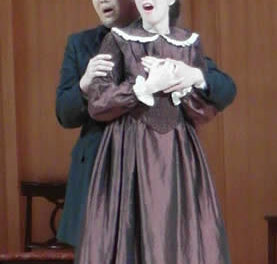Some 800 listeners were in Fletcher Hall of the Carolina Theatre of Durham February 9 for the 2:00 p.m. performance of Peter Klein’s touring production of George Gershwin’s opera Porgy and Bess. This same production with many of the same singers was given in Durham in 1998 and in March 2001 at ECU, where the performance was presented in concert form due to Wright Auditorium’s small stage. Most of the impressive lead singers in the Greenville performance were in the Saturday matinee in Durham. Klein’s version has been cut and telescoped into a taut and well-rehearsed theater experience. Cast members rotate roles.
Despite Fletcher Hall’s small size, operas performed there are miked, much to their depredation. Opera singers are musical and vocal athletes, and if they can’t fully project, they have no business in opera. Likewise, if a hall is so poor that miking is needed, it has no business being used for serious music. Last year in Wright Auditorium’s favorable acoustics, all of these lead singers projected with ease and with clear diction. In Durham, the deeper the voice, the more seriously were the singers surrounded by a “sonic ghost.” Thomas Elliot, a deep-voiced singer who portrayed Jim, sounded as if he were singing from within a hole in the ground; this would have been fine if this had been Strauss’s Salome and he had been John the Baptist! This same halo effect compromised the quality of the diction of the production’s larger-than-life villain, Crown, embodied by Stephen B. Finch (whom I have enjoyed in all three tours of this production).
Sound board/control panel enthusiasm may have also led to balance problems between the small but able pit orchestra, which covered parts of some scenes, especially Sportin’ Life’s seduction of Bess in Act III. Zoltán Papp, conductor of the National Theater of Pécs, Hungary, led the idiomatic performance. It was well within the standard tradition as to syncopation, rhythm and rubato.
Charlotte native son Samuel Clark Stevenson was outstanding as Porgy, giving a deeply moving performance that became wrenching in its pathos at the end of Act III. His ECU concert version had been impressive although it was unsettling to see a Porgy standing and towering over everyone! In Durham, with full staging and everyone in character, he disappeared into the role, but even on his little cart, he was as tall as most of the other cast members.
As in the ECU performance, Durham had the benefit of the dramatic soprano of Jerris Cates as Bess. Her strongly supported voice has an enormous dynamic range and solid high notes. Her Rubensesque Bess easily dominated the stage and she brought a full range of human emotions from drug-dazed lust to tender compassion for Porgy and others.
Finch remains unsurpassed as Crown, so villainous and stage filling that I still harbor concern for the hurricane when, as “the only real man here,” he dashes out of Catfish Row and into the maelstrom to bring back the distraught Clara. Malaika Sims’ Clara was the first solo voice heard in Act I as she sang the famous “Summertime” to her baby. She and her husband Jake are the only non-dysfunctional family group on Catfish Row (which is between Water Street and St. Michael’s Alley on Church Street in Charleston, S.C.). Composer Gershwin and his librettists, the Heywards, incorporated Gullah work songs into the net repair scene in Act I. The most direct African influence is found in the vigorous drumming of the Picnic Scene “I ain’ got no shame.”
No Porgy and Bess would be worthwhile without a strong but “subtle” villain, Sportin’ Life, a role too often given to non-operatic musical comedy personnel. A strong tenor voice helped Duane A. Moody bring the oily and serpentine aspects of Catfish Row’s parasite fully to life. He was all to ready to use “free samples” of “Angel Dust” to trap another victim. His “It ain’t necessarily so” was a tour de force.
A flavor of Old Charleston was present in the form of the street vendors–Peter, the Honey Man, embodied by Leon Browne (a veritable Ever Ready bunny of tics), the Strawberry Woman of Joan Donovan and the Crabman of Derek Foxx. Their characteristic songs about their wares were once an early-morning fixture of the City of Charleston. Indeed, in the early 1980s, I heard a real crabman singing his wares in the early morning down around Church and Tradd Streets.
Most of the supporting roles were strongly cast. Some women’s voices had more vibrato than I would have preferred. Danrell Williams was memorable as Jake, with his own boat and crew the most successful entrepreneur in Catfish Row. His “A woman is a sometime thing” was delightful. Special mention must be made of Barbara Mahajan’s marvelously theatrical performance of “I hates yo’ struttin’ style,” in which, using a meat cleaver and a fast patter worthy of Gilbert and Sullivan, she makes perfectly clear what she thinks of Sportin’ Life, the forceful “model major general” of Catfish Row.












